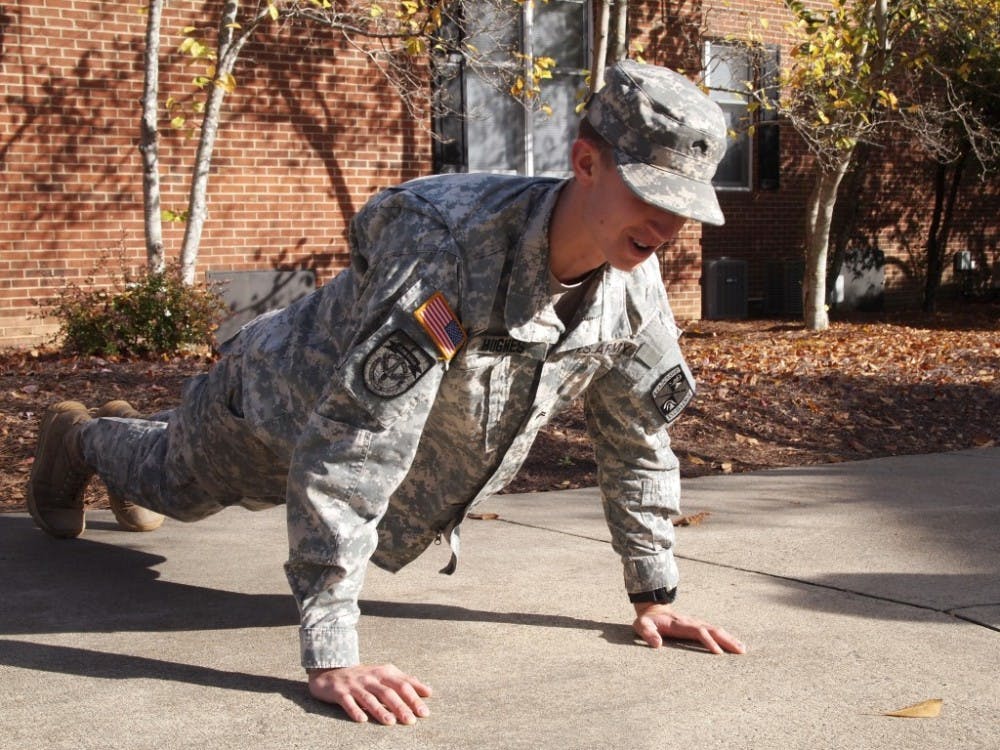It’s 4:50 a.m. The sun isn’t even up yet, the birds aren’t chirping and Elon University sophomore Austin Hughes’ alarm begins to buzz. Rolling out of bed, he puts on his camouflage uniform and heads to North Carolina A&T State University in Greensboro for physical training at 5:50 a.m.
Every Tuesday, Wednesday and Thursday he participates in a variety of physical activities, from running four miles to pushups and burpees, switching up exercises to keep all parts of his body trained. Training ends at 7 a.m., and he returns to Elon’s campus, avoiding traffic if he’s lucky.
Hughes is part of Elon’s Reserve Officer’s Training Corps (ROTC) program, which trains future commissioned officers of the United States Armed Forces. After Elon, he will serve eight years as an officer in the U.S. Army.
“Both my parents served [in the US Army], and both had great careers, so they encouraged it,” Hughes said. “Originally, I wanted to enlist right after high school, but they told me that if I wanted to serve I should be an officer.”
Currently, Hughes is contracted with a four-year scholarship from the Army. To keep this scholarship, he needs to graduate on time, maintain a 3.0 GPA and sign with the Army for eight years.
“I always knew I wanted to do it, but the scholarship made it the easiest decision ever,” Hughes said.
Hughes is a triple-major in finance, accounting and management. In addition to taking four classes to fulfill these degree requirements, he is also required by his program to take a classroom session Tuesdays from 3:20 to 5:10 p.m., as well as a leadership lab Thursdays from 3 to 6 p.m.
To attend these labs, he drives back out to Greensboro, where he will crawl on the ground, weapon in hand, walk through an ambush, or strategize how to cross a river with a one-rope bridge. Often times, he won’t return until 7 p.m., where he has more work to do.
“We have physical training tests once a month,” Hughes said. “Instead of having homework for these classes, I need to go to the gym every day.”
These additional classes can make scheduling difficult, especially because students in the ROTC program do not have priority scheduling. This semester, Hughes is taking all of his classes on Mondays, Wednesdays and Fridays to make this schedule work.
Hughes said the hardest part of the program is balancing it with a college life, especially when his day starts much earlier than the average college student’s.
“The college kids’ dream is to have all classes starting after 12,” Hughes said. “I can’t do that. On a Friday morning, I can be waking up when my roommates are going to sleep.”
There is a clear distinction between the professional appearance he upholds with his ROTC instructors, using “sir” and “ma’am,” compared to goofing around with friends, but he has found a balance. Recently, Hughes pledged with the Sigma Phi Epsilon fraternity to add more fun to his life.
Hughes said that although he needs to learn information about the fraternity like another class, the brothers are really understanding about his ROTC conflicts.
“Having a group of people that understand what you are trying to do and support you is really nice,” Hughes said. “With ROTC, I can’t join a lot of clubs. It’s nice to go to a place for fun where I don’t have to call you ‘sir’ or ‘sergeant.’”
Even though this balance can still be difficult, Hughes said the program’s benefits outweigh the challenges.
“They teach you things you will not learn in the classroom,” Hughes said. “I have learned leadership skills, time management skills, communication skills and discipline that will carry over to any job you apply for.”
Hughes’ suitemates have also learned from his ROTC lifestyle.
“Living with an ROTC student, I have been given a first hand look at just how dedicated the students are and it truly inspires me to live up to that standard of excellence in all aspects of my life,” said sophomore Jared Melanson.
Unlike most Elon students, Hughes needs to think about a twelve-year plan, rather than a four-year plan, considering the time he will spend in the army.
Although he will not find out where he will be stationed and what branch he will be in until mid-November, he would ideally like to go into the infantry. Hughes would lead a platoon of about 40 men, carrying out the orders of a plan on the field. If he says go left, his squad will all go left, no questions asked. However, with a degree in finance and accounting, they might want him to have a desk job in a financial department of the army. Hughes may end up working in finance while in the army because of the amount of money and energy devoted to him through ROTC.
“If they are investing $200,000 dollars on you, they don’t want you getting blown up,” Hughes said.
No matter where he ends up, the ROTC program has given Hughes leadership skills he can apply to any situation.
“You really develop your character,” Hughes said. “I now have self discipline. When your alarm goes off at 4:55 in the morning, you’re the only one who can get yourself up, and you do.”


